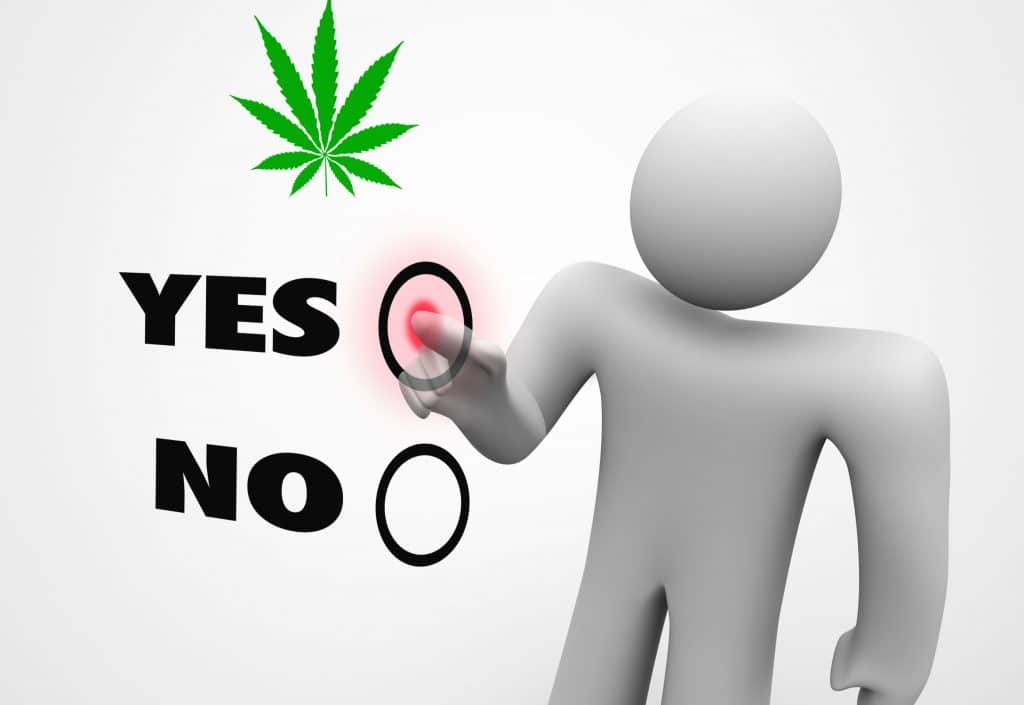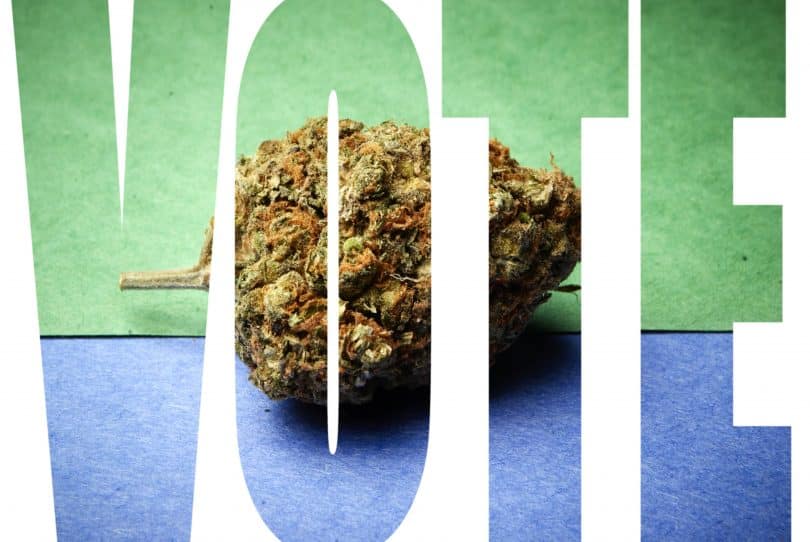They’re not there yet, and they might not get there, but this coming November, at least three states, (and possibly six), are putting it up to voters in yet more cannabis ballot measures for recreational legalizations. Will we get up to 25 legal states by the end of elections?
2022 elections are going to be exciting with up to six states voting on recreational cannabis ballot measures. This could mean that by the end of elections, half the states of the US will be legal! This independent news platform specializes in reporting on the cannabis and psychedelics industries of the US and beyond. Check out the Cannadelics Weekly Newsletter for daily updates and access to tons of product promotions, from vapes and edibles to cannabinoid products including the highly popular Delta 8 & HHC. Check out our ‘best of’ lists for details, and only choose the products you’re most comfortable using.
Missouri and Amendment 3
On Tuesday August 9th, the state of Missouri announced that in November elections, it will hold a ballot measure so voters can decide if they want to legalize recreational cannabis. This ballot was not a for-sure thing in the beginning, with activists originally looking like they couldn’t get enough petition signatures to get the initiative on the ballot. By law, at least six out of eight congressional districts need to reach the signature minimum to make it on. As of Tuesday, the petition was certified by Secretary of State Jay Ashcroft.
The activist group Legal Missouri 2022 was behind the initiative. Said campaign manager John Payne in a press release Tuesday, “Our campaign volunteers collected 100,000 signatures, on top of paid signature collection. That outpouring of grassroots support among Missourians who want to legalize, tax and regulate cannabis made all the difference.”
Should it go through, this Amendment 3 forces a change to the constitution of the state, amending its policy on marijuana so that residents 21 and above can purchase and use the drug. In fact, should it go through, it would go into effect as early as the end of this year. This is an incredibly fast implementation, because the amendment is already written, instead of a measure instructing the legislature to come up with laws.
The new amendment includes the following guidelines for the cannabis industry:
- Drop prohibition laws for purchase, possession, use, manufacture, sale, and transport of the drug for adults 21+
- Require a card for home-growing
- Allow those who are currently incarcerated for certain marijuana crimes, or who have incarceration histories, to petition for release/expungement
- Institute a lottery for licenses and certificates
- Ensure each congressional district gets an equal number of licenses
- Implement a 6% sales tax on cannabis products
The reason for this ballot measure is because Missouri’s republican-led congress has repeatedly killed previous marijuana reform bills. As ballot measures are kind of the new thing in weed legalization, advocates decided it was best to take it to the people. Like many other cannabis bills, this one comes with a provision to erase past cannabis convictions for non-violent marijuana crimes, and for those who didn’t sell to minors, or get arrested for marijuana-related driving infractions.
Explained Legal Missouri 2022’s Alan Zagier, “We’re talking about people who may still be on probation or parole or even had a conviction and did their time and paid their fine but yet it still comes up and is a hindrance in housing or employment.” He said the bill would “Provide a fresh start and wipe the slate clean for really tens of thousands of Missourians who each year find themselves arrested for low level drug offenses.”

South Dakota ballot measure
Missouri isn’t the only state letting the people decide the fate of recreational cannabis in November. Another state is South Dakota, and for this state, it means voting on such a measure for the second time. In the November 2020 elections, South Dakota voters passed two ballot measures to legalize both medicinal and recreational cannabis on the same day, via Measure 26 and Amendment A.
And though the story should have ended there, Governor Kristi Noem proceeded to conspire with law enforcement to bring a case against the win, in order to reverse it on the grounds that Amendment A broke the state’s law of only allowing single-measure ballots.
Noem’s participation was made clear when she made an executive order on February 8th, 2021. When this was appealed, it went to the Supreme Court. As the court is helmed by Noem appointee Christina Klinger, the ruling predictably upheld Noem’s order, ending the recreational legalization, and ostensibly taking away a voted-in win by her own constituents.
Now, the state has a new ballot measure ready to go this November, and considering the last one went through, there’s a pretty good chance this one will too. Initiated Measure 27 would legalize recreational use, as well as allowing the possession and distribution of up to one ounce. Individuals would be allowed to have three plants each, with a max of six plants per household. More than other states, this is an important ballot measure, because it works to offset a horrible injustice done to the people of the state, by their own governor.
…And Maryland
The third state with a confirmed ballot measure to legalize recreational cannabis in the upcoming November elections, is Maryland. On November 8th, residents of Maryland can vote on the Maryland Marijuana Legalization Amendment, which would allow residents 21 and above to access recreational cannabis starting in July 2023. The measure orders the State’s legislature to come up with laws to govern this new cannabis industry.
Maryland already has a decriminalization policy in place from 2014, which allows the possession of up to 10 grams or less without criminal sanctions. The state also has a medical program, instituted back in 2013.

The current measure stated as House Bill (HB) 1, and was approved in the House by a vote of 96-34 in February of this year. Less than two months later, the Senate also passed the bill with a vote of 94-39, showing overall mass support in all of the State’s legislature. For whatever reason, instead of simply allowing the bill to pass into law, the legislature decided to pass the vote onto the people; similar to what happened in New Jersey, which subsequently voted in its own recreational bill in 2020. This means, should the measure get a positive vote, it was passed by both the state congress, as well as the people.
More cannabis ballot measures: Arkansas, North Dakota and Oklahoma too?
On August 3rd it was reported that the Arkansas State Board of Election Commissioners rejected a measure to allow a recreational legalization measure from appearing on the 2022 ballot. The board approval was a second stipulation, as activists already turned in more than enough signatures to get the measure on the ballot. Then, in a turn of events, the State’s supreme court ordered the initiative to be allowed. The case was brought by the group Responsible Growth Arkansas in response to the Board of Election Commissioners refusal to certify the measure.
What’s the new stipulation? The case isn’t over. So though the measure now must be on the ballot, whether the votes get counted remains to be seen until the case is officially settled. The placement on the ballot is because the case was expedited to force the certification from the Board in time for elections, though the Board can still argue its case for merit of its denial. Should the board ultimately win, the vote will be null and void. Responsible Growth Arkansas turned in over 193,000 signatures which is over twice the number of necessary signatures for the ballot.
North Dakota already turned in more signatures than necessary for the North Dakota Marijuana Legalization Initiative, which would legalize recreational cannabis for adults 21+. The state requires 15,582 signatures, and the group New Approach North Dakota collected 25,762. Currently the signatures are awaiting verification in order for the initiative to get certified. Unless a major issue comes up, it looks like North Dakota will let its people choose the fate of cannabis in the state come November. This is the second time such a vote was put to the people, as a 2018 measure for the same thing, did not pass.
Oklahoma is also trying to get an initiative on the ballot this November. The group Oklahomans for Sensible Marijuana Laws collected more than 164,000 signatures, much more than the necessary 94,911. The state is awaiting the verification of these signatures. In the meantime, the attorney general’s office released a revised version of the ballot in order to make it comply with applicable laws. The signature verification was outsourced to third-party company Western Petition Systems, and it looks like, once again, unless something weird comes up, Oklahomans will decide themselves if cannabis should be legalized in November.
Conclusion
Recently, cannabis ballot measures to legalize recreational use have been mainly positive, indicating a strong likelihood that as many as six new states might join the recreational crew come fall elections. If that happens, the number of legalized states increases to 25, officially signaling that 50% of states are going against federal mandate. Though its not often reported this way, this will likely force the federal government to quickly legalize, so as not to look weak compared to its states. This should be a very interesting election when it comes to both state recreational cannabis legalizations, as well as federal government reaction.

Thanks for stopping by! You’ve made it to Cannadelics.com, the place to go for fully-rounded independent news covering the expanding cannabis and psychedelics industries. Stop by for daily updates, and head over to the Cannadelics Weekly Newsletter, to ensure you’re always in the loop of what’s going on.







